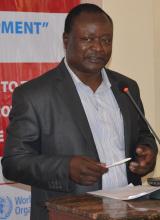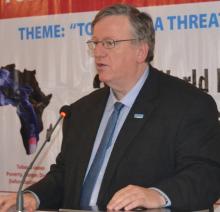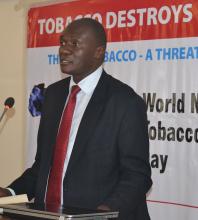Kenya commemorates World No-Tobacco Day
May 31 2017 - The World No-Tobacco Day in Kenya was marked with calls for effective policies, reduced exposure and tightening of loopholes to combat tobacco consumption. Speakers particularly emphasized on the theme, “Tobacco- a threat to Development” and on health and other risks associated with tobacco consumption.
The day was also observed with the launch of the National guidelines for Tobacco Dependence Treatment and Cessation which will provide guidance for intervention in healthcare services.
In an address in Nairobi, Dr Patrick Amoth, the head Inter-governmental Relations Unit, MOH, said the reality of tobacco use in Kenya was a great threat because of its health, social, economic and environmental consequences on all populations. He was holding brief for Mr Julius Korir, the Principal Secretary Ministry of Health.
He said tobacco was one of the four risk factors which are associated with the rising burden of Non-communicable diseases, NCDs, in the country. These diseases burdened the health system but also led to high productivity costs to the economy. It is estimated that more than 50% of the hospital admissions are due to NCDs.
He said the theme - “Tobacco- a threat to Development” - was timely in that it reaffirmed the need to look at the tobacco control through a whole-society approach and not just as a health issue.
“It is also a call for us to examine more keenly the role of tobacco on projected poverty and development” he added.
Recent surveys show that:
- 24% of Kenyans are exposed to tobacco smoke at home
- 13.3% Adults overall (23.9% Males And 4.1% Females) are current tobacco users-(STEPs Survey)
- 9.9% Youth overall (12.8% Males And 6.7% Females) are current tobacco users (GYTS)
Speaking at the commemoration, WHO Kenya Representative Dr Rudi Eggers said the tobacco epidemic was one of the biggest public health threats and was one of the major barriers to sustainable development with widespread impacts on health, economic growth, environment, education, finance and governance. It brought suffering, disease, death and impoverished families and strained national economies, he added.
“Tobacco is a threat to every person regardless of gender, age, race, cultural or educational background and is unfortunately a threat even if you do not smoke tobacco yourself,” he said.
“Just being in the presence of tobacco smoke may put you at risk.”
In Africa, about 146,000 adults aged 30 years and above died every year from tobacco-related diseases, he said, adding that up to half of all tobacco users would die prematurely from tobacco-related causes. On average, tobacco users lose 15 years of life making tobacco use one of the leading preventable risk factors for non-communicable diseases such as cardiovascular diseases, cancer, chronic lung diseases and diabetes.
He called for effective policies to reduce consumption including control of illicit trade in tobacco products and through increase of taxes and prices, which was an effective proven tool for reducing the demand for tobacco. The WHO Framework Convention on Tobacco (WHO FCTC) was the world’s most powerful tool to tackle tobacco’s negative impact on development, he added.
“This will discourage consumption and improve the health of people and communities and the burden of the disease and death,’’ he added.
He urged the government to reinforce its efforts towards tobacco control towards the 2030 Agenda of Sustainable development so “no one is left behind”. Implementation of the launched National Guidelines on Tobacco Dependence Treatment and Cessation would also help improve the development agenda of the country and a healthier citizenry, he said.
Expounding on the theme, Dr Gladwell Gathecha, Deputy Head at the NCDs Division said tobacco consumption had contributed to ill health (SDG goal 3) and affected all the Sustainable Development Goals meant to improve the health of populations. It affected the land and soil on which it is grown leading to degradation, increased poverty, societal inequalities and denied communities better alternatives like good education, better wages and profits which end up in the West.
The event was also addressed by Mr. Joel Gitali, the chairman of Kenya Tobacco Control Alliance who said despite the progress made in tobacco control, more support for farmers to quit growing tobacco and consistency by government to sustain what has so far been achieved was required.
It was also attended by various stakeholders.
____________________________________
For more information, please :
01. WR Kenya Dr Rudi Eggers receives a copy of the National guidelines for Tobacco Dependence Treatment & Cessation from Dr Patrick Amoth, MOH, while others look on
02. Participants at the WNTD 2017 commemoration
03. Mr Joel Gitali, the chairman of Kenya Tobacco Control Alliance speaking at the event
04. Dr Rudi Eggers, WR Kenya makes his remarks in which he calls for effective policies to reduce tobacco consumption
05. Dr Patrick Amoth, MOH, key speaker at the WNTD event in Kenya
06. Dr Gladwell Gathecha, MOH, outlines the harmful effects of tobacco consumption at the event









